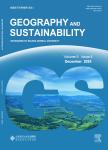Factors related to the functionality of community-based rural water supply and sanitation program in Indonesia
作者机构:Department of Health BehaviorEnvironmentand Social MedicineFaculty of MedicinePublic Health and NursingUniversitas Gadjah MadaIndonesia Sekolah Tinggi Teknologi Sapta TarunaIndonesia Environmental Science for Sustainable Energy and Technology(ESSET)School of Life Sciences and Environmental Technology(ATGM/ALST)Avans University of Applied SciencesThe Netherlands
出 版 物:《Geography and Sustainability》 (地理学与可持续性(英文))
年 卷 期:2023年第4卷第1期
页 面:29-38页
核心收录:
学科分类:07[理学] 0701[理学-数学] 070101[理学-基础数学]
主 题:Rural water supply PAMSIMAS Functionality Indonesia Bayesian belief networks Logistic regression
摘 要:This study used multinomial logistic regression and Bayesian belief networks(BBN)to analyze factors influenc-ing the functionality of the community-based rural drinking water supply and sanitation program(PAMSIMAS)in Indonesia.28,936 PAMSIMAS projects in 33 provinces in Indonesia were *** data indicates that 85.4%of the water supply systems were fully functioning,9.1%were partially functioning,and 5.5%were not *** the regression analysis,good management is positively associated with functionality and a high investment per capita is negatively associated with the *** latter suggests the need for comprehen-sive economic analysis in the feasibility study in scattered housing sites and remote-undeveloped *** also found that high community participation at the beginning of the project was associated with the not functioning system,while women’s participation was positively associated with the ***,the household connection is more likely to be functioning than communal *** analysis shows if the beneficiaries do not pay for water,the probability of not functioning systems is 20 times higher than systems with fee ***,the combination of strong management,strong financial status,and household connection rather than communal connection increases the probability of fully functioning to 98%.Improvement of data collection is also necessary to monitor the current conditions of all PAMSIMAS systems in *** study offers a country-level perspective for better implementation of the community-based rural water supply and sanitation program in developing countries.



